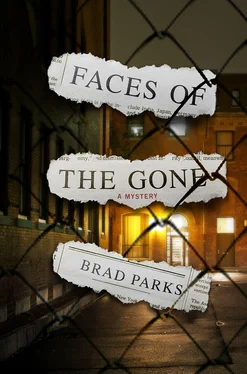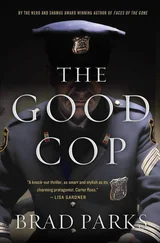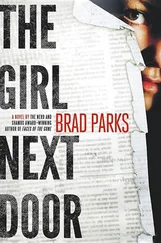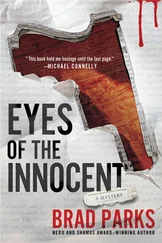Brad Parks - Faces of the Gone
Здесь есть возможность читать онлайн «Brad Parks - Faces of the Gone» весь текст электронной книги совершенно бесплатно (целиком полную версию без сокращений). В некоторых случаях можно слушать аудио, скачать через торрент в формате fb2 и присутствует краткое содержание. Год выпуска: 2010, ISBN: 2010, Издательство: Minotaur Books, Жанр: Триллер, на английском языке. Описание произведения, (предисловие) а так же отзывы посетителей доступны на портале библиотеки ЛибКат.
- Название:Faces of the Gone
- Автор:
- Издательство:Minotaur Books
- Жанр:
- Год:2010
- ISBN:9780312574772
- Рейтинг книги:3 / 5. Голосов: 1
-
Избранное:Добавить в избранное
- Отзывы:
-
Ваша оценка:
- 60
- 1
- 2
- 3
- 4
- 5
Faces of the Gone: краткое содержание, описание и аннотация
Предлагаем к чтению аннотацию, описание, краткое содержание или предисловие (зависит от того, что написал сам автор книги «Faces of the Gone»). Если вы не нашли необходимую информацию о книге — напишите в комментариях, мы постараемся отыскать её.
Faces of the Gone — читать онлайн бесплатно полную книгу (весь текст) целиком
Ниже представлен текст книги, разбитый по страницам. Система сохранения места последней прочитанной страницы, позволяет с удобством читать онлайн бесплатно книгу «Faces of the Gone», без необходимости каждый раз заново искать на чём Вы остановились. Поставьте закладку, и сможете в любой момент перейти на страницу, на которой закончили чтение.
Интервал:
Закладка:
But, in the long run, slack management, shoddy maintenance, and neglectful tenants made it just as bad as the tenements it replaced. And as the city died around it-with the middle class fleeing and the factory jobs disappearing-Booker T settled slowly into a mire from which there was no rescue. By the turn of the twenty-first century, it had gotten so bad the city decided there was only one way to fix Booker T: tear it down.
But even that wasn’t easy. There were disagreements among city, state, and federal governments about who should pay for the demolition. There were residents who didn’t want to leave. Then there were the illegal residents-the squatters, the drifters, the junkies, an entire underworld of people who hacked their way through the plywood that covered the windows and doors and used the buildings for their own shadowy purposes.
That was the Booker T I was venturing into, a place that was worse than a ghost town because the souls that haunted it were still alive. If you took a snapshot of Booker T at any one moment, you might not see anything living, besides perhaps one of the stray cats that came to hunt for rats.
But if you stayed for a while, you’d inevitably see some vagrant shuffling through. Or you might notice a tendril of smoke escaping from a window where someone had lit a fire inside a trash barrel.
Those were the people I was looking for, people who had slipped through society’s safety net, past the dozens of nonprofits and churches that may have tried to catch them, and hit rock bottom. They were, to say the least, a difficult cohort to interview. Many of them suffered from delusions and paranoias that made their grasp on the real world anywhere from tenuous to nonexistent. Some would be so high they might as well be mentally ill.
Still, I had to try.
I parked my car along the street that ran outside Booker T, a collection of six block-long, four-story brick buildings. In the middle was a massive courtyard, around which Booker T’s social life had rotated for fifty years.
The sense of desolation in the courtyard was overwhelming. This had once been a place where friends gathered, where stories were told, where summer days were passed, where lives were led. And now it had been surrendered to an eerie kind of urban emptiness: not the slightest bit of human activity greeted my arrival.
After maybe fifteen minutes, a lone woman wandered through, saw me, and turned in the other direction. It was no use trying to catch up to her.
Next came a man doing the junkie stumble, staggering in a chaotic pattern, unseeing and unknowing. He had a boisterous conversation going with himself, one that consisted of bits of words followed by loud, dry coughing. I considered talking to him but decided I’d be better off trying to interview one of the stray cats.
In the darkness, and with the cold numbing my senses, time became hard to judge. Had I been there thirty minutes or three hours? It didn’t matter. I would stay as long as needed until. .
There. A man. Walking at the far end of the courtyard. The buildings were numbered, one through six, and he was in between numbers one and two. The darkness and lack of moonlight made it difficult to see what he was doing, but, yes, he had momentarily halted. Had he seen me and frozen, hoping to elude detection? Was he going to flee?
No, he was turning. He was facing Building Two. And he was. .
Pissing on it.
Iwaited for the man to dispense with his business, giving him the kind of time and distance I might appreciate were I urinating on a public building. Once he restored his gear, I moved in, approaching noisily so he knew I was coming. When I was still about forty feet away, I hollered out the biggest, friendliest “Hi, there!” I could summon.
“I’m sorry to bother you, sir,” I continued, still trying to sound as harmless as I could.
I had gotten near enough to see the man was looking at me like I was his first extraterrestrial sighting. He was wearing sneakers that appeared several sizes too big and several decades too old. I guessed he was wearing all the clothes he owned, though even with all that padding he seemed gaunt and undernourished. He had one of those patchy-bald heads, the kind older black men get when they don’t have the good sense to just shave it all off. His age, as with most advanced addicts, was difficult to guess-somewhere between forty-five and seventy-five. All you really knew for sure was that life had been hard on him.
“I’m a reporter with the Eagle-Examiner, ” I said, coming closer still.
“You sellin’ newspapers?” he slurred, even more puzzled.
I laughed. I was now close enough to see and smell his breath, which could have flunked a Breathalyzer from ten paces away. That was actually a good sign. In my experience, the drunks were slightly more coherent than the druggies.
“No, sir. I’m a reporter. I don’t sell the newspaper. I write it.”
“Izzat so?” the man said, smiling curiously. Thank goodness, an amiable drunk.
“Yes, sir. I’m working on a story about a drug dealer named Hundred Year.”
He recoiled.
“He dead?” the man asked. “Thas what folks been saying.”
I nodded. The man spat deliberately on the ground. “Good. I don’t like to speak no ill of the dead, but he pick on ol’ people for the hell of it. He one nasty bastard. You gonna tell people he wasn’t no good in your newspaper, yeah?”
“If that’s what’s true. That’s why I’m trying to talk to folks around here. You got any friends?”
“Oh, I got some friends. But let me ask you somethin’. You think if I help you write your newspaper, maybe you could help get me a little something to eat?”
Ah, Newark. The hustle never stops.
“That can be arranged,” I said, smiling.
“Well, then, all right. You all right.”
Having gained his approval, I decided I might as well get to the point. “I’m trying to figure out what brand of heroin he sold.”
“Couldn’t say. I don’ touch that junk,” the man said proudly. I love addicts and their logic: the guy who had been pickling his liver with alcohol for thirty years could express disdain at the thought of ever using a drug. Meanwhile the neighborhood crackhead was smugly thinking that at least she wasn’t some slurring alchy.
“You know anyone who might have bought from him?”
“ ’Round here? Shoot. Jus’ ‘bout everyone.”
He gestured as if we were at a crowded cocktail party. I looked around at the still-empty courtyard. “Know where I could find them?”
The man thought for a moment. “S’pose I do,” he said.
“By the way, my name is Carter Ross,” I said. Normally I would have stuck out my hand for him to shake. But having been subjected to such a graphic demonstration of where his hand had just been, I kept my fingers anchored in my pocket.
“Folks call me ‘Red,’ jus’ like Red Sanford, ’cept my family name is Coles,” he said. He was about 150 pounds shy of passing for Red Sanford. And he was so jaundiced, folks should have called him “Yellow Sanford.”
“I’ll follow you,” I said. “You’re my tour guide.”
“Okay, now I know a woman, she like the mayor of this place. I’m goin’ to see her now,” he said, then elbowed me in a conspiratorial fashion. “I kind of mess aroun’ with her a little bit.”
God bless the male spirit: here was a man who had no home, no job, no money, a raging case of cirrhosis and Lord knows what other maladies. But he still wanted me to know he was getting some ass now and then.
I tailed Red toward Building Five and watched as he scampered up a Dumpster, onto a fire escape, up a flight of stairs, and through a vacant spot in a plywood window. I was impressed at how smoothly he moved, given his condition. Obviously, he had been doing this for a while. With all my youth and relative health, I was struggling to keep up. When I reached the window, Red was inside gesturing for me. There was no sign of light or life.
Читать дальшеИнтервал:
Закладка:
Похожие книги на «Faces of the Gone»
Представляем Вашему вниманию похожие книги на «Faces of the Gone» списком для выбора. Мы отобрали схожую по названию и смыслу литературу в надежде предоставить читателям больше вариантов отыскать новые, интересные, ещё непрочитанные произведения.
Обсуждение, отзывы о книге «Faces of the Gone» и просто собственные мнения читателей. Оставьте ваши комментарии, напишите, что Вы думаете о произведении, его смысле или главных героях. Укажите что конкретно понравилось, а что нет, и почему Вы так считаете.












